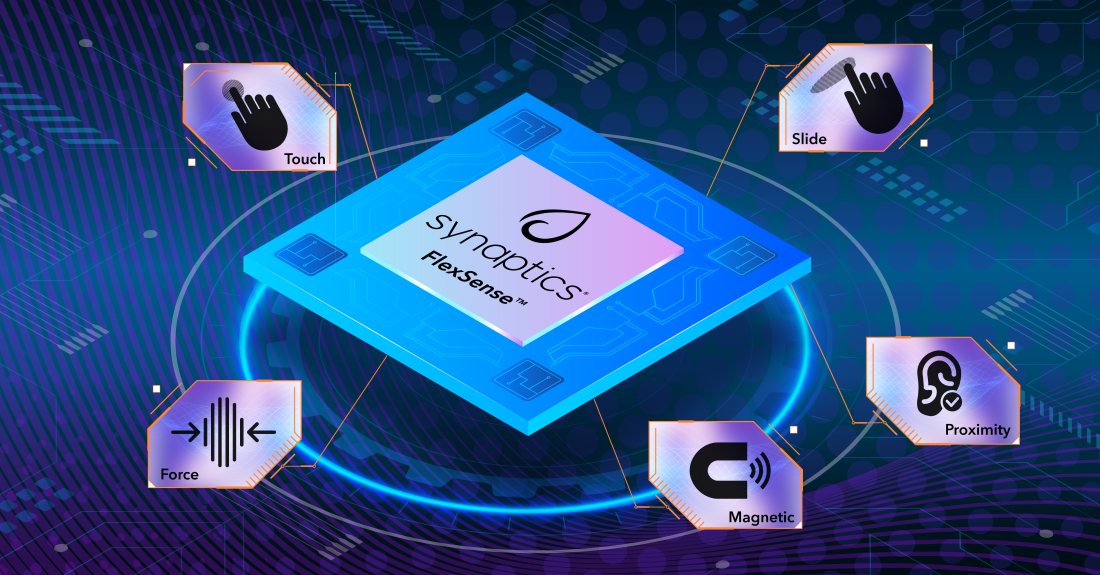Plug Into More Green Stock News
Tap into the pulse of emerging green sectors every morning. Top daily headlines from clean energy, cleantech, cannabis, and sustainable transport stocks:
Synaptics’ FlexSense™ 4-in-1 Sensor Fusion Processor Ushers in Era of Intuitive IoT Applications
Synaptics® Incorporated (Nasdaq: SYNA), today announced the FlexSense family of sensor processors which captures and intelligently handles input from up to four sensors in a tiny, ultra-low-power form factor that is up to 80% smaller than existing solutions. Integrating a mix of capacitive, inductive, Hall effect and ambient sensing into a single processor with proprietary algorithms, the FlexSense family brings reliable, low-latency, and context-aware force, proximity, and touch sensing to Internet of things (IoT) devices such as true wireless stereo (TWS) earbuds, gaming controllers, augmented reality (AR) and virtual reality (VR) headsets, fitness bands, remote controls, and smart thermostats.
"Today's IoT devices are using multiple sensors to create richer interactions with users, but discrete implementations consume too much space and power, complicate system design and component supply chains, and don’t respond appropriately to false activations," said Mahesh Srinivasan, VP, Smart Sensing and Display at Synaptics. "By intelligently fusing multiple sensors in a single processor with proprietary algorithms, we enable more robust and reliable solutions for IoT applications that allow more intuitive and responsive interactions—while reducing system design, cost, configuration, and supply chain complexity for our customers."
Architecture and key benefits
FlexSense incorporates a central microcontroller that connects to two proprietary low-power, extremely fast analog front end (AFE) engines. These AFE engines quickly and efficiently sense and digitize data from the capacitive and inductive elements on the touch surfaces of an IoT product. The Hall effect sensors are implemented via metal plates on the device that detect magnetic fields, while an on-chip temperature sensor measures ambient temperature.
Capacitive sensing is typically used to detect finer grain touch, proximity, and actions such as fingers sliding on a surface. Inductive sensing can distinguish coarse grain touch, up to 256 levels of force, and actions such as knob rotation, while the Hall effect sensor detects magnetic fields, such as those from a magnet embedded in a docking station.
The integration of multiple sensors on a single chip achieves a number of critical goals, including:
- Reduced power, size, weight, and cost
- Easier sensor calibration and configuration
- Lower latency (critical for gaming and touch error mitigation)
- Greater ability to execute more tightly coupled and accurate compensation algorithms to ensure baseline stability and adjust for temperature drift to enhance overall reliability and performance
- Lower assembly cost, higher yield, and a simplified supply chain due to the use of a single device instead of multiple discrete components
The result is a single highly flexible, stable, and reliable sensor processor measuring 2.62 mm2, that can replace up to four ICs with a combined size of 16.04 mm2 for an 80% decrease in footprint. It consumes 240 µW (typically) in-ear (for a TWS application), and 10 µW in a dock or "sleep" mode.
Higher-order functionality with multi-sensor combinations
The FlexSense architecture further incorporates the ability to combine multiple sensor inputs and use higher-order, sophisticated algorithms to detect and implement more complex interactions with an IoT device. Some examples of such interactions are:
- Combining Touch + Force using capacitive and inductive sensors to more reliably determine intent and reduce mis-touches
- Combining Temperature + Force + Touch using capacitive, inductive and temperature sensors to improve accuracy in wet or high moisture environments
- Combining Proximity + Dock Detect using capacitive, inductive and hall sensors to avoid false activations when a device is set down
Real-time analysis of the incoming data—enabled by the tight sensor integration—ensures the optimum response to match user expectations.
"It's important to bridge the gaps between the requirements of increasingly high-functioning IoT devices, and the need to accelerate product development cycles, while also simplifying the supply chain," said Patrick Moorhead, CEO and Chief Analyst at Moor Insights & Strategy. "Particularly with battery powered and small-form-factor applications, creative approaches like FlexSense have the potential to solve these issues while providing a richer, more intuitive experience for the end user."
For developers, the FlexSense family accelerates time to market by providing a simple, highly configurable, out-of-the box solution with a single processor and up to eight analog input channels that can be configured to mix and match up to four different sensors. Developers can use Synaptics' powerful FlexSense Configuration Tool to tune all inputs through a single interface, allowing rapid development and deployment of end solutions.
Availability:
FlexSense is sampling now and the EVK is available upon request.
For more information visit https://www.synaptics.com/products/integrated-sensors or contact your local Synaptics sales representative.
About Synaptics Incorporated
Synaptics (Nasdaq: SYNA) is changing the way humans engage with connected devices and data, engineering exceptional experiences throughout the home, at work, in the car, and on the go. Synaptics is the partner of choice for the world’s most innovative intelligent system providers who are integrating multiple experiential technologies into platforms that make our digital lives more productive, insightful, secure, and enjoyable. These customers combine Synaptics' differentiated technologies in touch, display, and biometrics with a new generation of advanced connectivity and AI-enhanced video, vision, audio, speech, and security processing. Follow Synaptics on LinkedIn, Twitter and Facebook, or visit www.synaptics.com.
Synaptics, and the Synaptics logo are trademarks of Synaptics in the United States and/or other countries. All other marks are the property of their respective owners.
Media Contact
Synaptics Inc.
Patrick Mannion
Dir. of External PR and Technical Communications
+1 631-678-1015
This email address is being protected from spambots. You need JavaScript enabled to view it.


Plug Into More Green Stock News
Tap into the pulse of emerging green sectors every morning. Top daily headlines from clean energy, cleantech, cannabis, and sustainable transport stocks:
More Green Stock News
More Green Stock News
| Last Trade: | US$90.54 |
| Daily Change: | -0.93 -1.02 |
| Daily Volume: | 948,492 |
| Market Cap: | US$3.530B |
January 05, 2026 November 12, 2025 November 06, 2025 October 28, 2025 October 15, 2025 | |





